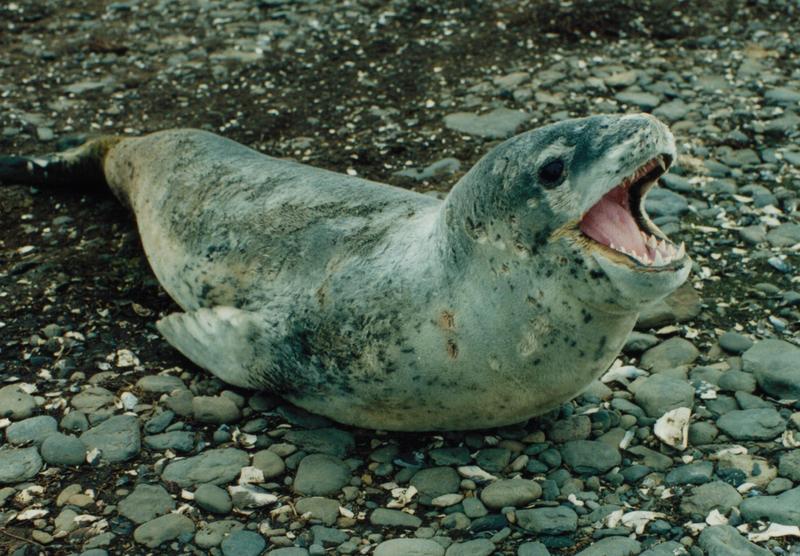|
| 질의: King penguin | 결과: 80번째/103 | |
Leopard Seal (Hydrurga leptonyx) - Wiki
| 제목: | Leopard Seal (Hydrurga leptonyx) - Wiki
| |

| 해상도: 3102x2154
파일크기: 735640 Bytes
등록시간: 2007:02:25 16:26:20
|
Leopard Seal
From Wikipedia, the free encyclopedia
[Photo] fr: L??opard de mer (Hydrurga leptonyx) en: Leopard seal (Hydrurga leptonyx). scan de photo : B.navez - Kerguelen - 1999
The Leopard Seal (Hydrurga leptonyx) is one of the "true seals" belonging to the family Phocidae. It is the only species in its genus. Leopard Seals are the second largest species of seal in the Antarctic (after Southern Elephant Seals), and are near the top of the Antarctic food chain. Orcas are the only natural predators of Leopard Seals.
Physical description
Leopard Seals are large and muscular, with dark gray backs and light gray bellies. Their throats are whitish with the black spots that give the seals their common name. Females are generally larger than the males. The bulls are usually about 2.8 meters long and weigh up to 320 kg, while cows are around 3.0 meters in length and weigh up to 370 kg. Very large females can reach over 3.5 meters and weigh over 600 kg.
Compared to most phocids Leopard Seals are highly envolved for their role as keystone predator. Although they are true seals and swim with their hind limbs, they have powerful highly developed forelimbs similar to a Sea lion, giving them a maneuverability similar to sea lions and fur seals. Like these eared seals, Leopard seals are shallow water hunters, and do not dive deep like Weddell seals, Ross seals and Elephant seals, which can all dive to several hundred meters in search of squid. Leopard seals have unusually loose jaws that can open more than 160 degrees allowing them to bite larger prey.
Like most carnivores, their front teeth are sharp, but their molars lock together in a way that allows them to sieve krill from the water, similar to crabeater seals. Their senses of eyesight and smell are highly developed. These senses, coupled with streamlined bodies that enable the seals to move swiftly through the water, ensure that they are formidable predators.
Behavior
Leopard Seals live in the cold waters surrounding Antarctica. During the summer months, they hunt among the pack ice surrounding the continent, spending almost all of their time in the water. In the winter, they range north to the sub-Antarctic islands. Occasionally, individuals may be spotted on the southern coasts of South America, Australia, and New Zealand, and as far north as the Cook Islands. Juveniles are more often found in the north. The animals are generally solitary, gathering only in the breeding season.
They feed on a wide variety of creatures: smaller seals probably eat mostly krill, but also squid and fish. Larger Leopard seals probably switch to feed on King and Emperor Penguins and, less frequently, seals such as Crabeater Seals.
When hunting penguins, the Leopard Seal patrols the waters near the edges of the ice, almost completely submerged, waiting for the birds to enter the ocean. It kills the swimming bird by grabbing the feet, then shaking the penguin vigorously and beating its body against the surface of the water repeatedly until the penguin is dead. Previous reports that Leopard seals skin their prey have been proved incorrect. Lacking the teeth necessary to slice their prey into managable pieces, they flail their prey from side to side in order to tear and rip it into smaller pieces
Leopard Seals are bold, powerful and curious. In the water, there is a fine line between curiosity and predatory behaviour, and they may 'play' with penguins that they do not intend to eat. In 2003, a Leopard Seal dragged a snorkeling biologist underwater to her death. Though aggressive behaviour and Leopard Seal attacks on humans had been previously documented, this was the first known incident in which a human had been killed by the animal. Leopard Seals have also been known to snap at people's feet through holes in the ice.
http://en.wikipedia.org/wiki/Leopard_Seal
| The text in this page is based on the copyrighted Wikipedia article shown in above URL. It is used under the GNU Free Documentation License. You may redistribute it, verbatim or modified, providing that you comply with the terms of the GFDL. |
|
댓글 |
|---|
| | 손님 |
|
Scientific Name: Hydrurga leptonyx (de Blainville, 1820)
Common Names: Leopard Seal, Sea Leopard |
^o^
동물그림창고 똑똑전화 누리집
^o^
|
|
|